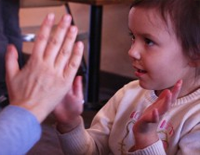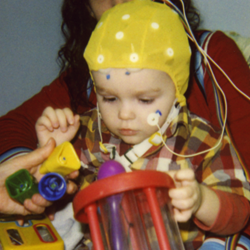A new discovery to be published in the journal Developmental Science reports that speech directed to 11- to 14-month-old infants predicts both their concurrent and future language accomplishments, and points to practical information useful for parents. The first factor linked to success in language is the use of “parentese” (rather than standard adult-directed speech). The second factor predicting success is … Read More
I-LABS research published in PLOS ONE: I’ve got you under my skin
New research by I-LABS Co-Director Andrew Meltzoff and his colleagues Joni Saby and Peter Marshall is the first to show that babies’ brains are activated in particular ways when an adult performs a task with different parts of her body. The research published in the PLOS ONE shows that when 14-month-old babies simply watched an adult use her hand to … Read More
I-LABS Researcher controls colleague’s motions in 1st human brain-to-brain interface
University of Washington researchers have performed what they believe is the first noninvasive human-to-human brain interface, with one researcher able to send a brain signal via the Internet to control the hand motions of a fellow researcher. Using electrical brain recordings and a form of magnetic stimulation, Rajesh Rao sent a brain signal to Andrea Stocco on the other side of the UW campus, … Read More
Brain responses to words in 2-year-olds with autism broadly predict future skills
A new I-LABS research discovery, published in PLOS ONE, shows that the pattern of brain responses to words (measured using Event Related Potentials) in 2-year-old children with autism spectrum disorder predicts those children’s skills when they reach 4 and 6 years of age. The brain measure of word processing not only predicted outcomes on standardized tests of the children’s language … Read More
Gender Stereotypes About Math Develop as Early as Second Grade
Children express the stereotype that “math is for boys, not for girls” as early as second grade, according to a new study by I-LABS’ researchers Dario Cvencek, Andrew Meltzoff and Anthony Greenwald. The research findings, published in the May/June 2011 issue of Child Development suggests that, for girls, lack of interest in math may come from culturally communicated messages about … Read More
Gender Stereotypes About Math Develop as Early as Second Grade
Children express the stereotype that “math is for boys, not for girls” as early as second grade, according to a new study by I-LABS’ researchers Dario Cvencek, Andrew Meltzoff and Anthony Greenwald. The research findings, published in the May/June 2011 issue of Child Development suggests that, for girls, lack of interest in math may come from culturally communicated messages about … Read More




